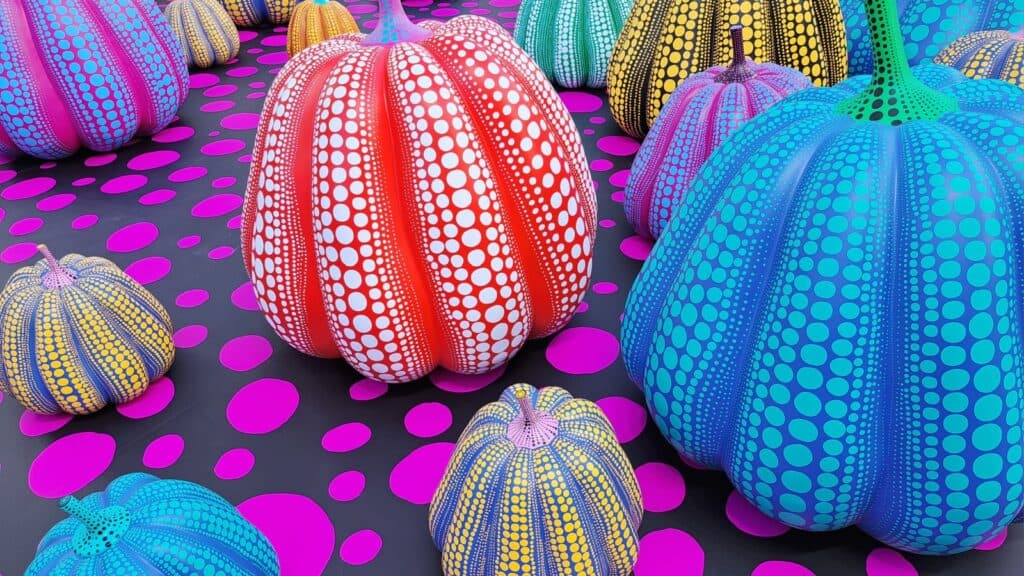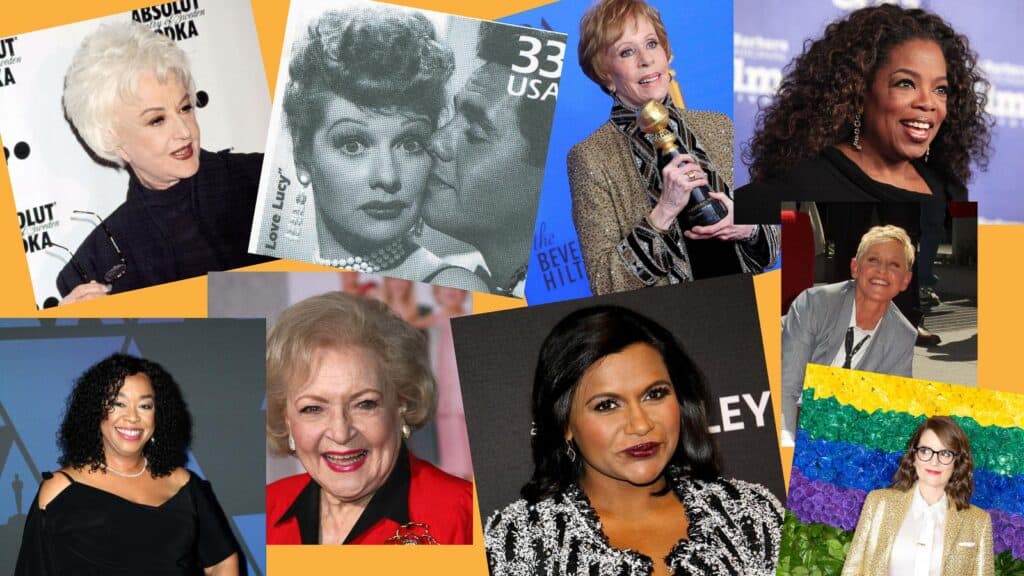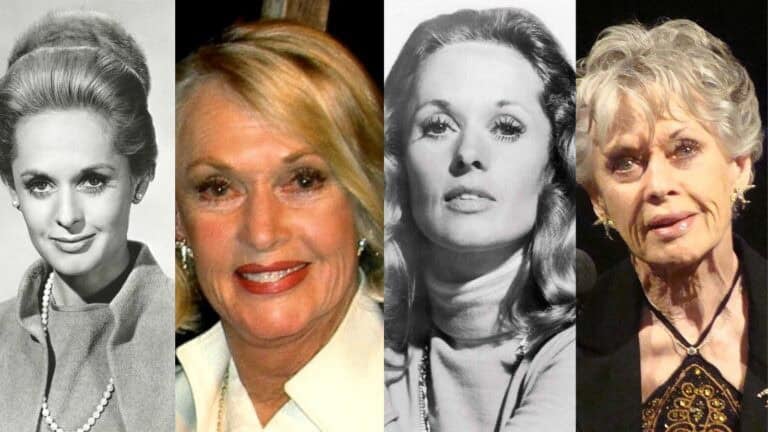13 Female Artists Breaking Barriers and Making History in the Art World
While it’s safe to say that women have been historically left behind in the art world, it’s also a contemporary issue. Many of the greatest contemporary female artists are not well-known, but we’d like to change that, especially because there are so many inspiring ones.
You might know Frida Kahlo, Annie Leibovitz, and Georgia O’Keeffe, but we’ve rounded up some other fabulous modern female artists you may not be familiar with. Discover how these exceptional artists made their mark in the art world.
1. Yayoi Kusama

Yayoi Kusama, a Japanese artist born in 1929, is celebrated for her distinctive use of polka dots and immersive installations. Her work often reflects her experiences with hallucinations, which she began having as a child, making every installation deeply personal.
Kusama’s art spans various mediums, including painting, sculpture, and performance, and explores themes of infinity and self-obliteration. She has voluntarily lived in a psychiatric hospital for many years, which she describes as a large source of her inspiration.
Installations like Infinity Mirror Rooms invite you into a boundless universe of repeating patterns, challenging perceptions of space and self. Walking through them feels like strolling through a different astral plane.
2. Marina Abramović

Serbian artist Marina Abramović is a pioneering figure in performance art, known for using her body as both subject and medium. Born in 1946, Abramović’s work explores the limits of physical and mental endurance, involving intense interactions with her audience. And yes, they’re supposed to make you uncomfortable.
Abramović’s upbringing in a politically active family influenced her exploration of themes like identity, power, and the human condition. Her performances, such as The Artist is Present, challenge the boundaries between performer and viewer, creating a shared space of vulnerability and connection, which can be unsettling, but also fiercely meaningful.
3. Shirin Neshat

Born in 1957, Shirin Neshat uses photography, video, and film to address themes of exile and displacement, as well as the intersection of Eastern and Western cultures. Iranian-born, she is renowned for her powerful exploration of cultural identity and gender in the context of Islamic societies.
She uses stark contrasts in her pieces, such as the juxtaposition of black-and-white imagery, to highlight the complexities of identity and power dynamics. Neshat’s art provides a voice for women in the Middle East, and an important aim of her art is to inspire more empathy and inclusion in the world.
4. Kara Walker

Kara Walker, an American artist born in 1969, is known for her provocative exploration of race, gender, and identity through large-scale silhouettes and installations.
These magnanimous works are captivating in their size alone, but the art goes beyond scale, delving into the history of slavery and its enduring impact on African American identity.
Walker’s use of black paper cutouts creates stark, haunting images that invite viewers to confront uncomfortable truths about America’s past. Her unapologetic art challenges audiences to engage with the narratives of power and oppression, using historical references to spark dialogue and reflection on contemporary social issues.
5. Wangechi Mutu

Kenyan-born artist Wangechi Mutu, born in 1972, creates multimedia works centered around femininity, cultural identity, and environmental degradation. She uses hybrid female forms, combining human, animal, and botanical elements to challenge traditional notions of beauty.
Mutu’s work addresses the impact of colonialism and globalization on African societies, using collage, sculpture, and video to create complex, layered narratives.
Her art considers the interconnectedness of cultural and ecological systems while highlighting the resilience and creativity of women. The connection between the earth and women is undeniable in her art.
6. Jenny Holzer

Jenny Holzer, an American conceptual artist born in 1950, is known for her use of text as art. Her works, typically displayed in public spaces, deliver thought-provoking messages about control, violence, and social justice.
Holzer’s use of vibrant LED displays, projections, and posters transforms everyday environments into places for reflection. Her Truisms series, a collection of short statements, encourages audiences to question societal norms and engage in dialogue about pressing issues.
These pieces directly tap on the viewer’s shoulder and go “Hey, this is weird, right?” Holzer’s art is a powerful reminder of the impact of words in shaping public consciousness and effecting change.
7. Tracey Emin

British artist Tracey Emin, born in 1963, is a leading figure in the Young British Artists movement, known for her raw, autobiographical works. She puts it all out there. Emin’s art spans various mediums, including painting, sculpture, and installation, incorporating themes of love, loss, and identity.
Her candid exploration of herself, including her trauma and sexuality, ignites an intimate dialogue about vulnerability and resilience. Emin’s work challenges societal taboos and encourages a deeper understanding of the complexities of human emotion and experience.
8. Cindy Sherman

Cindy Sherman, an American photographer born in 1954, uses self-portraits in a revolutionary way. With her own image, she explores identity and representation. Sherman’s work often involves transforming herself into various characters, using her body to challenge stereotypes and societal expectations of women.
Her Untitled Film Stills series, featuring Sherman in roles inspired by classic cinema, critiques the portrayal of women in media — a rich topic that demands discussion. Through her art, Sherman questions the authenticity of identity and the influence of cultural narratives on self-perception.
How much of our self-perception is dictated by society? The answer is personal, and that’s what Sherman asks viewers to contemplate.
9. Barbara Kruger

An American conceptual artist born in 1945, Barbara Kruger, creates bold text and image collages that critique consumer culture and gender politics. Her iconic works, featuring phrases like “Your body is a battleground,” challenge viewers to look at society through a more critical yet artistic lens.
Kruger’s art uses striking visual language to engage audiences in conversations about identity, desire, and the commodification of the human experience. And in today’s digital, advertising, social media age, we are all commodified. Her work continues to inspire dialogue about the role of media and advertising in shaping public consciousness.
10. Louise Bourgeois

French-American artist Louise Bourgeois (1911–2010) is renowned for her powerful sculptures and installations that explore themes of family, memory, and the subconscious. Her stunning spider sculptures, such as Maman, symbolize maternal strength and protection. This spider looms over viewers, creating a sense of fear and fortitude all at once.
Bourgeois’s work delves into personal narratives, using abstract forms to convey psychological states. Her art challenges viewers to confront their own fears and desires, making her a pivotal figure in the development of contemporary sculpture and feminist art.
11. Hilma af Klint

Swedish artist Hilma af Klint (1862–1944) was a pioneer of abstract art, whose work predates that of her male contemporaries like Kandinsky and Mondrian. That’s right, she did it first.
Af Klint’s paintings, often inspired by spiritualism and theosophy, feature bold colors and geometric forms that convey metaphysical concepts. Her art invites viewers into a mystical realm, exploring the connections between the material and spiritual worlds. She likes to “life the veil” as some might say.
Despite being largely unrecognized during her lifetime, af Klint’s work has gained significant acclaim posthumously, reshaping the narrative of art history. She is a reminder of the importance of appreciating female brilliance.
12. Prune Nourry

French artist Prune Nourry, born in 1985, uses sculpture, photography, and performance to explore the physicality of the human body with severity and playfulness simultaneously. The impact of cultural norms on women’s bodies and autonomy is a bold theme in her work.
Nourry’s art is deeply personal, reflecting her own experiences with illness and recovery, as seen in her documentary Serendipity. The dynamic between the body, the self, and an illness is something underexplored in modern art, but Nourry dives into it.
Nourry challenges viewers to consider the intersections of art, science, and the human experience. Like many other modern female artists, she aims to increase empathy in society with her works.
13. Maya Hayuk

American artist Maya Hayuk, born in 1969, is known for her vibrant, large-scale murals that blend geometric patterns with psychedelic colors. These mesmerizing pieces are just as beautiful as they are dizzying.
Her work draws inspiration from diverse sources, including mandalas, quilts, and outer space, creating immersive environments that celebrate the harmony of color and form.
Hayuk’s art transforms urban landscapes into dynamic canvases. These works invite viewers to share in the joy and energy she leaves on the canvas. Her murals are a testament to the power of public art, and she makes art that is truly for everyone.
The Chronic Invisibility of Female Artists

These women, some of whom are no longer with us, used their personal experiences, from trauma to joy, to create art that can effect change. But no matter how bold, brilliant, or brand-new their ideas were, they still don’t seem to get the recognition that male contemporaries do.
Women shouldn’t have to die before their work is appreciated, but many do. Overall, female artists are not given the same platforms as male artists, relegating them to the shadows of the art world. If you have a female artist you love, do women everywhere a favor and scream about her from the rooftops.
National Museum of Women in the Arts: Redefining How we See Women Artists & Their Art

The National Museum of Women in the Arts recently concluded a two-year closure for renovations and expansion. Located in the heart of Washington, D.C., the museum unveiled its newly renovated galleries back in October.
READ: National Museum of Women in the Arts: Redefining How we See Women Artists & Their Art
10 Trailblazing Women Who Have Shaped Television History

Television has long been a powerful medium for storytelling, entertainment, and cultural influence. Throughout its history, numerous talented women have made significant contributions to the world of television, breaking barriers, challenging norms, and leaving an indelible mark on the industry. From on-screen talent to behind-the-scenes innovators, these women have influenced television in profound ways. Here are 10 trailblazing women who have shaped television history. We have included some of their television associated awards, as well as awards that extend beyond TV.
READ: 10 Trailblazing Women Who Have Shaped Television History
Join Us

Join us on this empowering journey as we explore, celebrate, and elevate “her story.” The Queen Zone is not just a platform; it’s a community where women from all walks of life can come together, share their experiences, and inspire one another. Welcome to a space where the female experience takes center stage. Sign up for our newsletter so you don’t miss a thing, Queen!







